An interview with Gabviota Libertad, Consejo Nacional Indígena-Yucatán
By Olivia León
November 25 as the International Day for the Elimination of Violence against Women has its origins in the Latin American feminist movement in 1980. It arose in response to and in commemoration of the murder of the Mirabal sisters in the Dominican Republic. In 1999, the United Nations General Assembly recognized this date as an international commemoration to invite “governments, agencies, bodies, organs, funds and programs (…) to organize on that day activities aimed at raising public awareness of the problem of violence against women”.
From November 25 to December 10, International Human Rights Day, are the 16 days of activism to eradicate violence against women as a frontal commitment to guarantee human rights. It is about making violence visible, telling about it in order to understand and address it.
It is important to recognize how women’s organizations around the world work to eradicate and prevent violence. We seek to focus on the importance of creating women’s spaces within the movements. In this interview, Gabviota Libertad, who participates in the National Indigenous Congress of the National Indigenous Congress (NIC) of Yucatán.
Zapatista women’s meetings open possibility of safe spaces
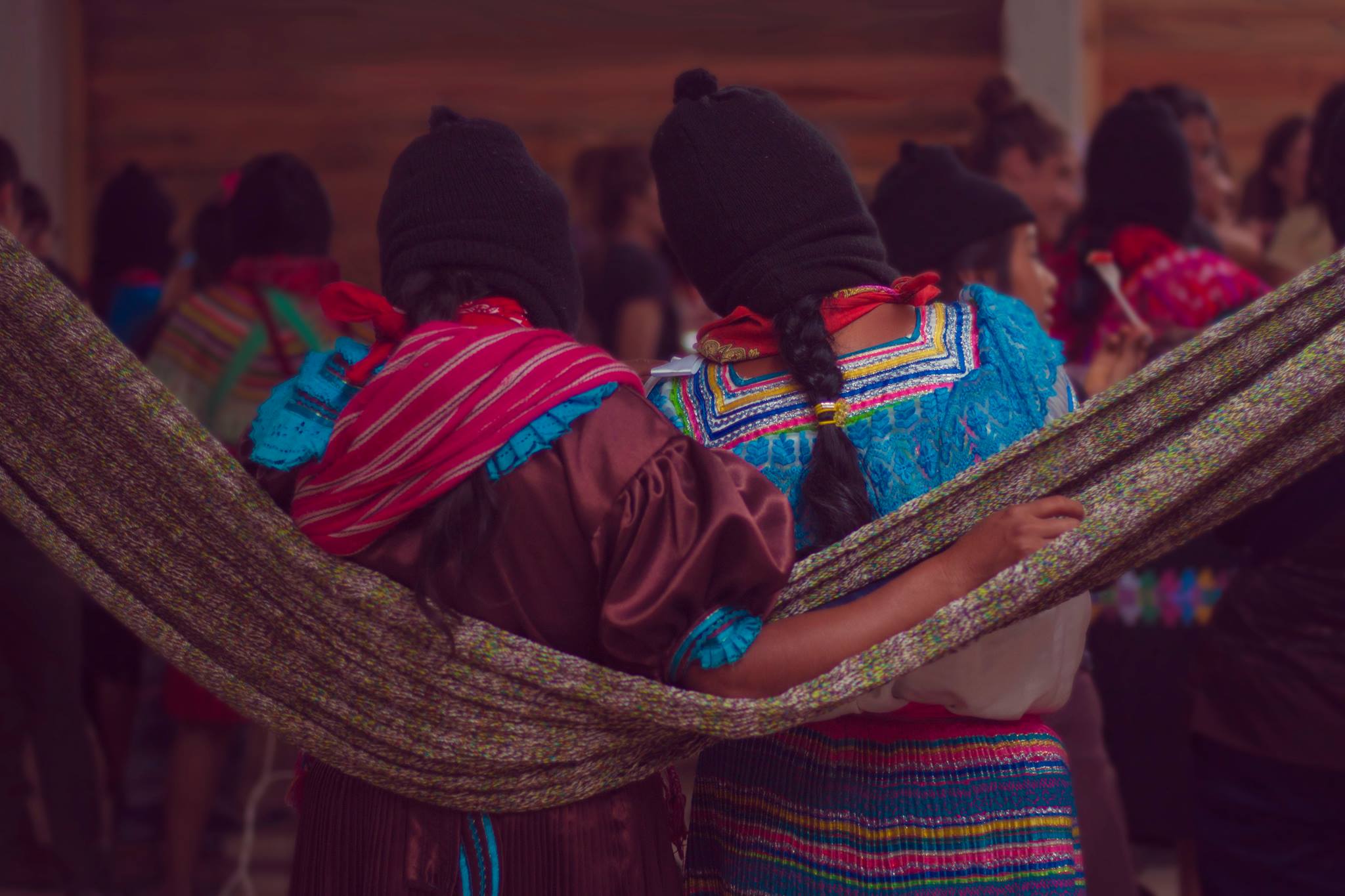
Recognizing individual and collective violence has allowed us to take action to reduce it and initiate healing processes. This requires spaces to report them in a safe and supportive environment. The First Encounter of Women in Struggle, convened by the Zapatista women of the Zapatista Army of National Liberation (EZLN), offered this kind of experience and encouraged the creation of women’s spaces within the NIC as well.
In the Communiqué of the Clandestine Revolutionary Indigenous Clandestine Committee-general command of the EZLN that called for the women’s meeting for 2018, it says “Well that we know that the bad system not only exploits us, represses us, robs us and despises us as human beings, it also exploits us again, represses us, robs us and despises us as the women that we are.”
Violence after violence. The only condition to join that meeting was: “that you are a woman and that you fight against patriarchal and sexist capitalism”.
Gabviota Libertad, who has been participating in the NIC Assembly for about 10 years and as a young woman was a member of the Zapatista National Liberation Front, shared with Mira: feminisms and democracies her experience at the First Encounter:
“This was the first invitation where there were no male comrades. It was a different experience. Seven thousand women from different parts of Mexico and the world; it was an international call. There were posters where you could sign up: you could give talks on childhood, for example, or on conscious menstruation. Whatever everyone wanted. There were those who woke up early to do yoga. Others were playing basketball or soccer with the sports-loving Zapatista comrades. There were others who made music; they brought drums and instruments. Others were with the political stuff. It was crazy.”
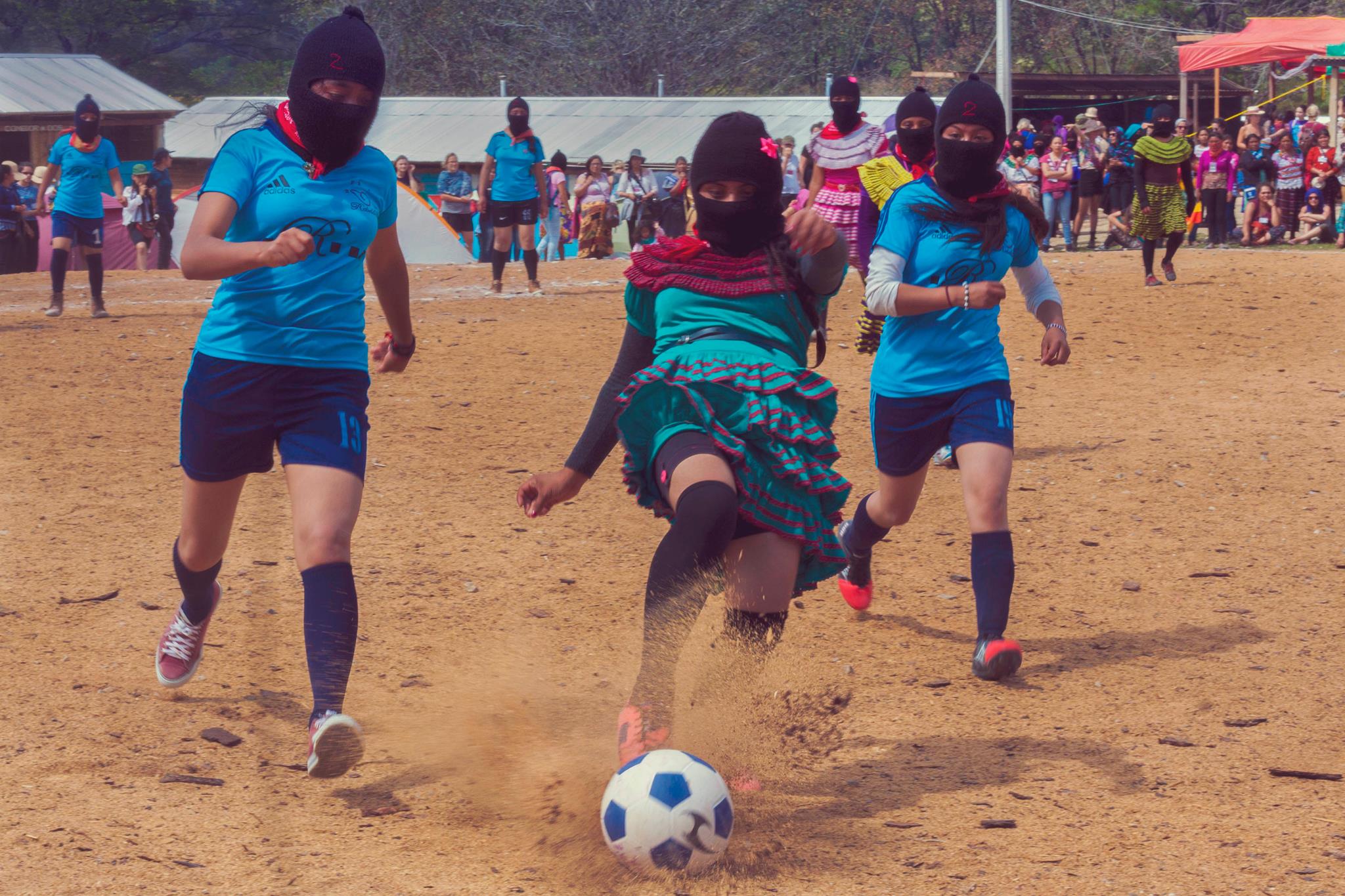
After this meeting, they thought of capacity building workshops on patriarchy, capitalism, extractivism and experiences of autonomous organization, which served to exchange experiences, analyze contexts and better understand the forms of systemic oppression and women’s resistances around the world.
A year later, in 2019, the Zapatistas convened the Second Meeting of Women in Struggle. This time, with a single theme: violence against women. “And that theme in two parts: a denunciation and another, what are we going to do to stop this massacre that they are doing to us,” as the Zapatistas stated in the communiqué to the Second Gathering of Women Who Struggle. In this space, by and for women and children, hundreds of women gave their testimonies of the violence they had suffered, some denouncing for the first time in their lives.
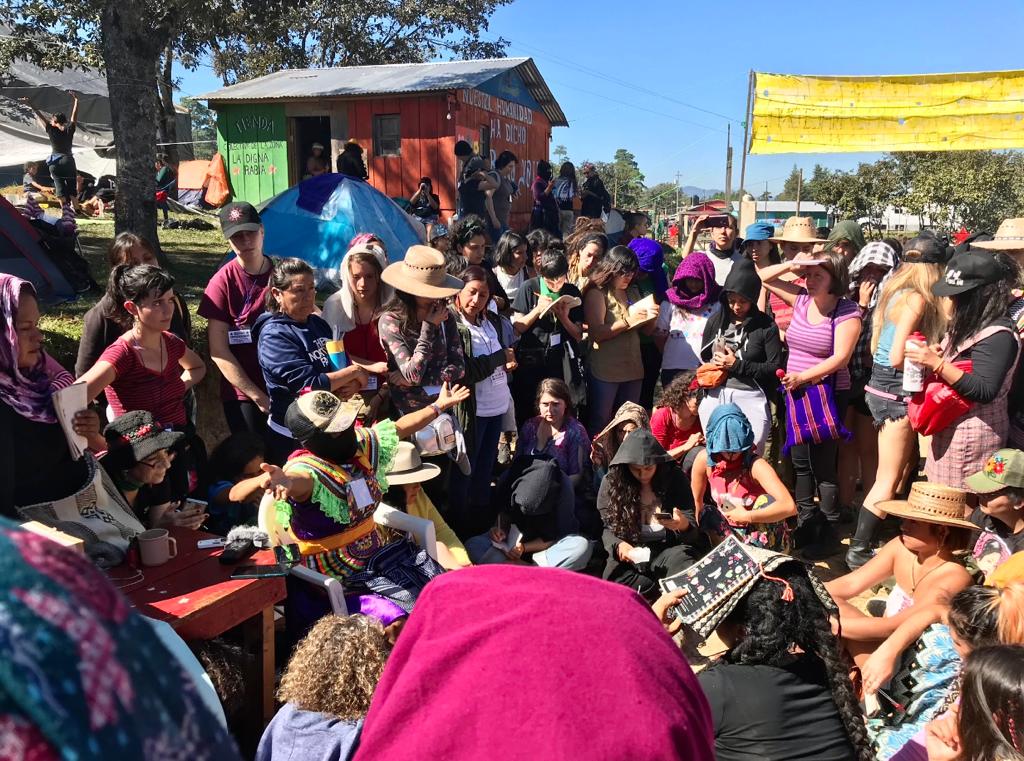
The creation of spaces for women in the NIC
The First Meeting of Women in Struggle was the catalyst to continue with the creation of spaces where women from the different regions participating in the CNI have been able to meet to dialogue and make agreements as women. Thus, after the appointment in 2017 of the spokesperson of the CIG – CNI, comrade Marichuy, different working groups were also formed, one of them the Women’s Working Group. One of the first actions of this group was to organize a first CIG/CNI women’s meeting in Mexico CDMX and later, that same year 2018, a National Women’s meeting.
“We always look for political training processes, and this one was always about capitalism. After the meeting convened by the Zapatista comrades, we proposed to the Coordination (of the CNI) the need for a political training workshop on patriarchy.”
The first meeting convened by the CNI, in 2018, brought together indigenous women from all over the country and from different organizations, including Otomí, Wixárika, Yaqui, Cholulteca. It was important to exchange experiences with women from the city and the countryside, from the south and the north. It was clear that there were shared experiences because they were women.
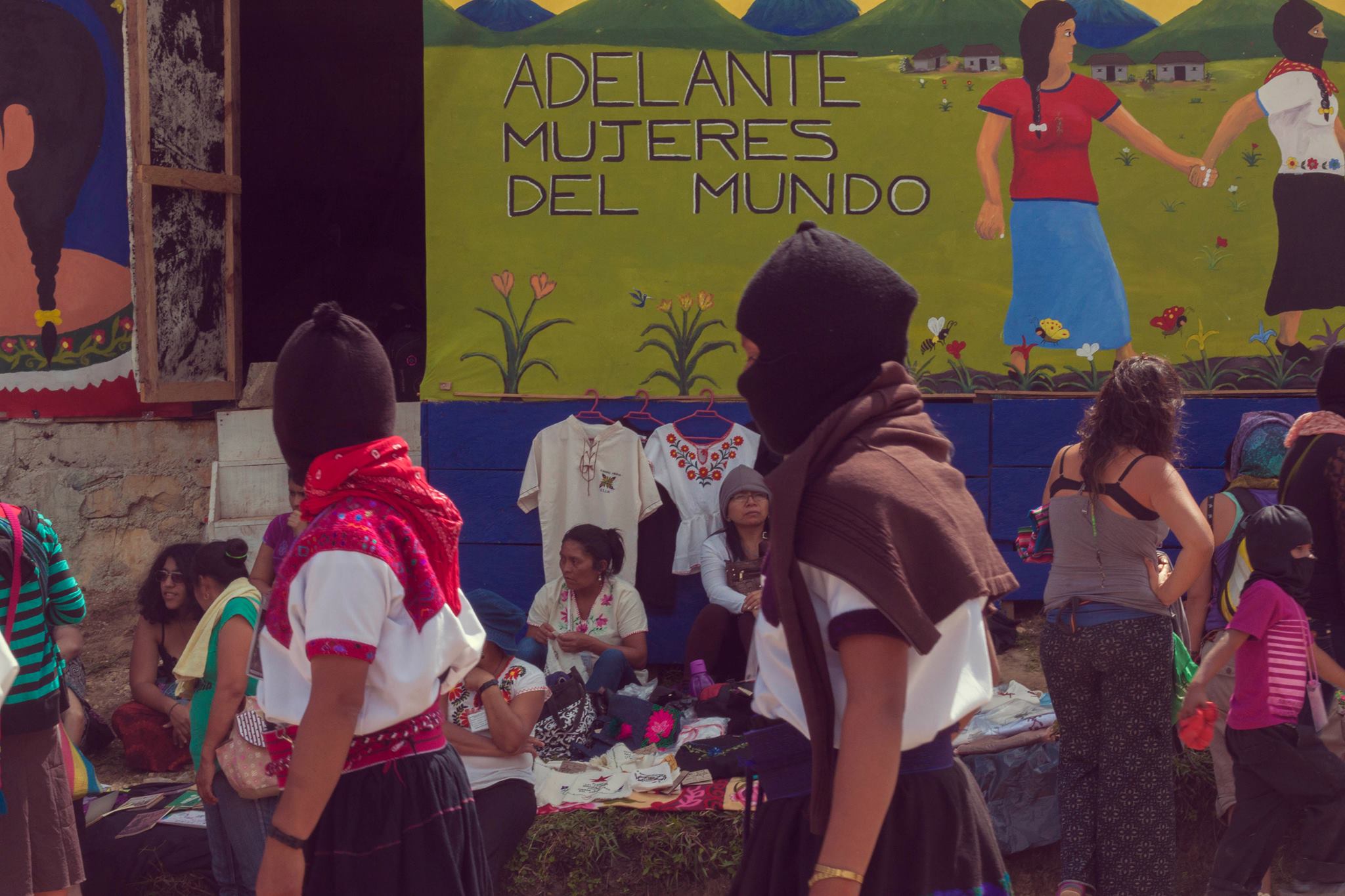
Gabviota explains that these experiences had always been discussed; not in the General Assemblies, but informally among the women who participated.
“In the General Assemblies we did refer to violence. The issues we talked about revolved around the big problems: the aqueduct of the Yaquis, whose water is being taken away from them; in the peninsula before the Tren Maya we had the planting of transgenic soybeans, real estate – issues of the anti-capitalist struggle. How are we going to confront these processes of oppression, of dispossession that we are facing as peoples? Of course, there was a connotation of gender violence, but that was hardly talked about.”
“We are all at the bottom, we are all screwed and we are all oppressed, but there are those of us who are lower and more oppressed.”
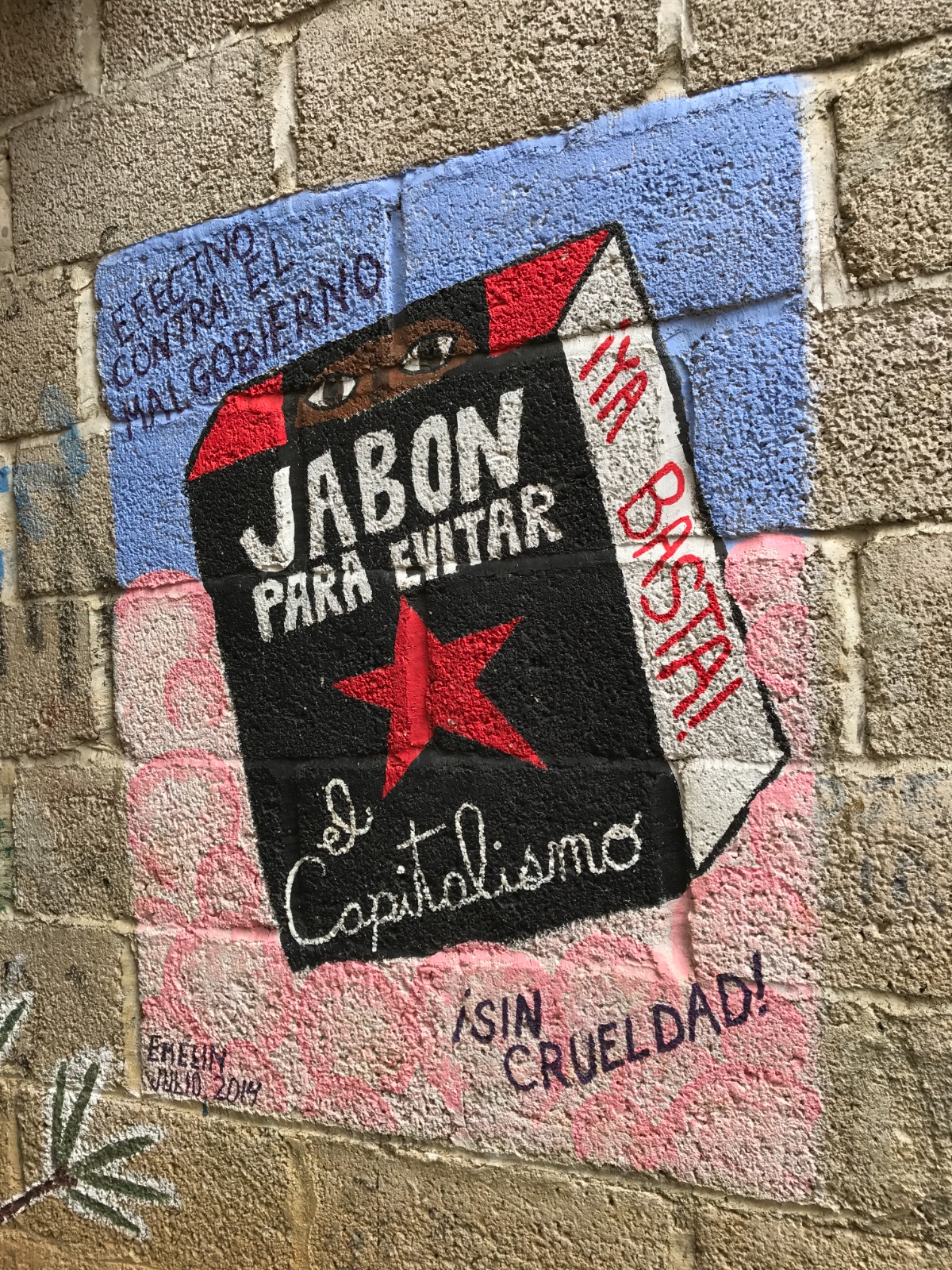
“What we in the group say is that it’s easy for all of us to be anti-capitalist. We already are. The comrades of all the organizations have always been anti-system. To fight against capital is to fight to the outside. Within the CNI there is no businessman trying to screw others. Anti-capitalism is very frontal. When we say that our struggle, in addition to being anti-capitalist, is anti-patriarchal, we mean that we are also going to fight to eradicate this other mechanism of oppression, because we realize that there is a system much older than capitalism, a system that is the root of all this disaster and that has led us to this situation: it is the patriarchal system or patriarchy. For this reason, we take up from some of our Bolivian comrades the idea that ‘patriarchy is the origin of all oppressions, all exploitations, all violence and discriminations that humanity and nature experience’ and that it has been built for thousands of years, in a violent way on the exploitation and devaluation of women and their bodies.”
Gabviota points out that the process involved recognizing that, “we are all at the bottom, we are all screwed and we are all oppressed, but there are those of us who are lower and more oppressed.”
She explains that, with naming themselves anti-patriarchal, there was a major challenge within the organization because it was a transformation in discourse that could not remain in words. The women in the CNI women’s working group committed themselves to ensuring that the changes would result in actions and, to this end, they developed popular education methodologies to better understand what they meant when they referred to anti-patriarchal struggle: What violence did it imply for the women comrades? Why to create new spaces, perhaps more intimate, such as the community, the family, friendships? How to combine the anti-capitalist struggle with the anti-patriarchal struggle? In the end, both oppose systemic dynamics of domination and oppression.
These women’s spaces made it possible to understand the complexity of the multiple layers of oppression and to strengthen the mixed organizations themselves. To this end, they developed political training workshops on patriarchy. They organized two workshops over eight months, planned with theatrical techniques, in which they worked on raising awareness of what it is to be a woman in different spheres. It was an invitation to question different experiences and analyze their positions within the community.
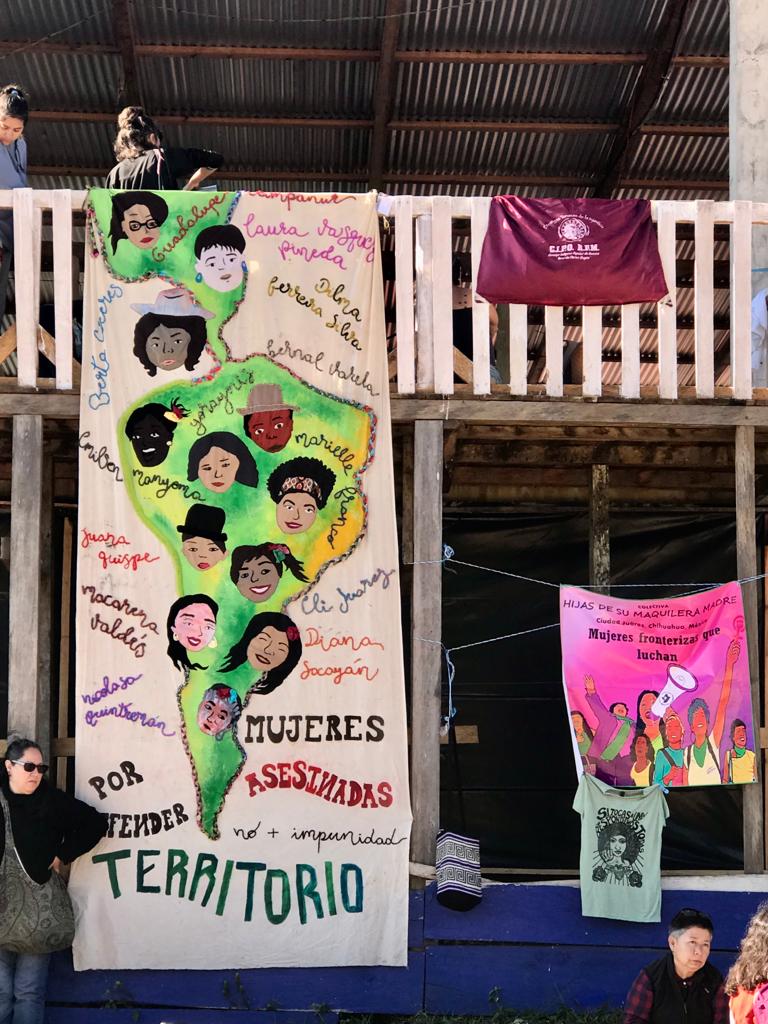
The light that does not extinguishes or the seed that was sown
Women’s meetings, particularly those convened by women from indigenous peoples, have taught fundamental lessons on the road to justice and peace. These spaces have proven to be crucial, not only as places to make visible violence faced by women, but also as forums where collective responses to violence are built, experiences are exchanged and solidarity is strengthened.
They are an inspiring model of organization and resistance and highlight the importance of popular education and the collectivization of experiences as mechanisms for the construction of a new, different world: where all worlds fit, where being born a woman or indigenous does not mean violence, contempt or discrimination.
As we reflect globally on November 25 and the 16 days of activism, it is important not to limit the struggle against gender-based violence to a few days a year. Organized women, from their own contexts and identities -as Gabviota Libertad from CNI tells us- are developing constant collective processes in the country, the region and the world.
Building safe spaces for women stands as a cornerstone on this path, challenging the external manifestations of violence and the patriarchal dynamics embedded in our communities, organizations and social structures.
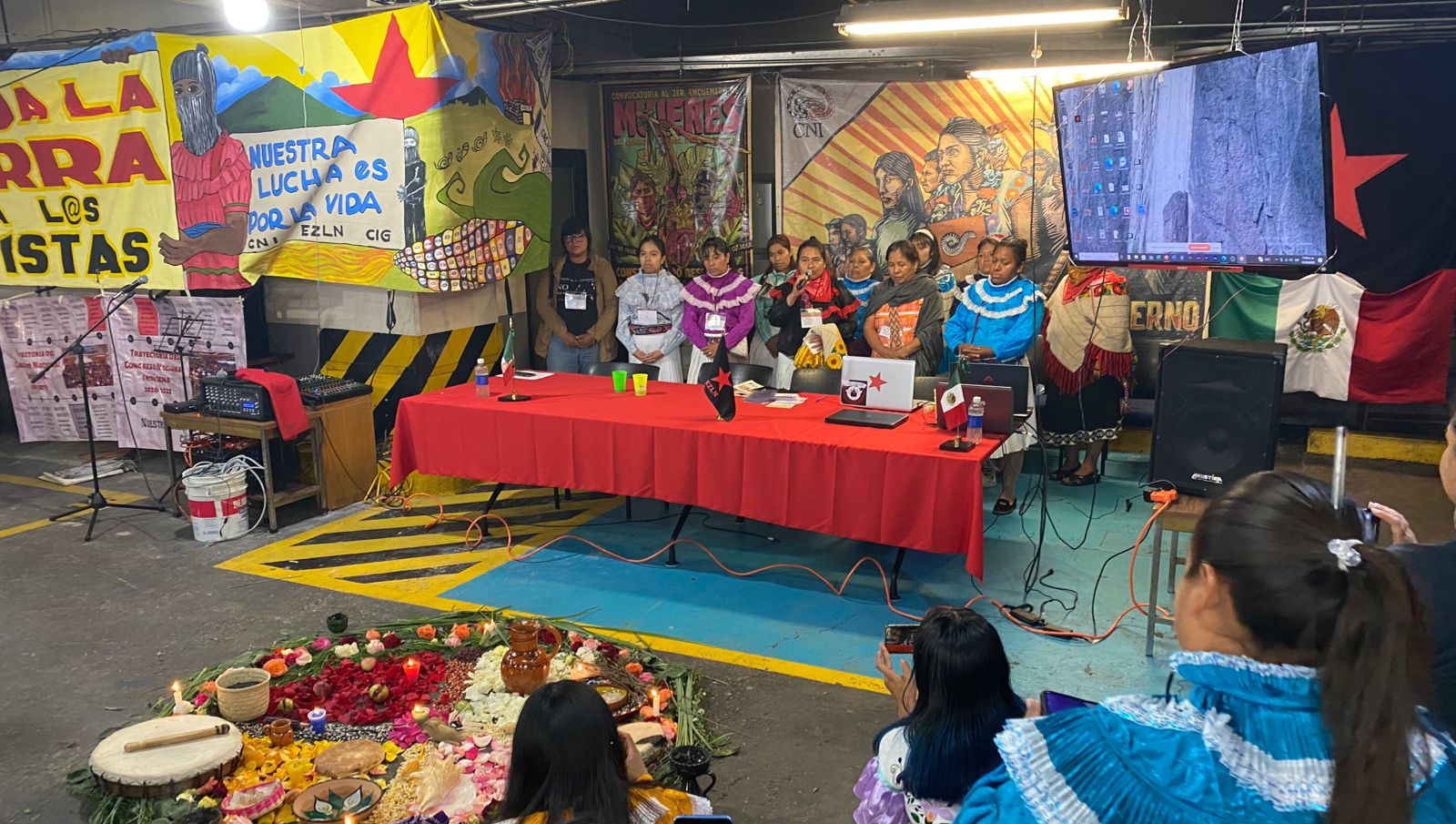
“We know this process is going to take a long time because transformation processes are long, but once you wake up to this thing -feminism, calling it in urban terms- there’s no turning back. It is going to take time for us to be able to say that we have begun to deactivate the patriarchal structure, but understanding how things are allows you to think about where to go, to dream that girls are not going to be hit harder, that the world is going to be different.
In the struggles we are going to be defeated many times, but popular education and from the pedagogy of hope we allow ourselves to think that things are changing.”
Gabviota Libertad
Olivia León is the Coordinator of Mira: Feminisms and Democracies. She specializes in issues on gender, peace-building processes and justice.
—–
The meetings or workshops of women and on patriarchy to which the CNI has convened since 2018 are:
11/02/2018: Meeting of women CIG/CNI with women from Mexico CDMX.
28/07/2018- 29/07/2018: National Women’s Meeting Sn. Lorenzo Nenamicoyan, Edo. de México
27/07/2019- 28/07/2019: National Women’s Gathering San Juan Volador, Pajapan, Veracruz
25/11/2019: Participation of CNI women in the Latin American Action against all forms of violence against women and femicides.
December 20, 2019 (caracol Jacinto Canek/cideci). Workshop on patriarchy and capitalism to the CIG and CNI in the framework of the fourth assembly between CNI and CIG.
12/02/2022- 13/02/2022: Workshop for multipliers of the workshop on patriarchy of the CNI Sn. Pedro Atlapulco, Edo. de Mexico.
Feb.- Aug./2022: Replication of the workshop on patriarchy in different regions.
Aug.-Aug./2023. First national internal meeting of CNI women from all regions.



